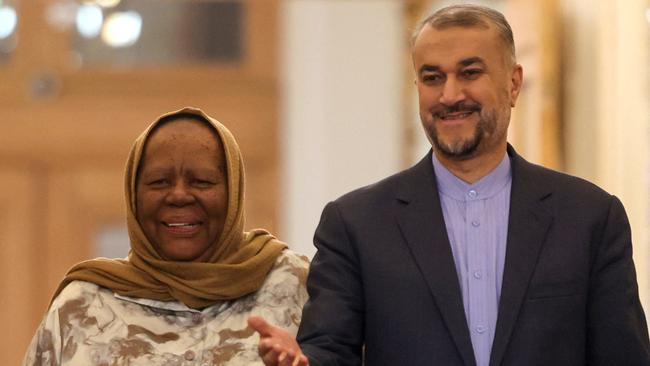Iran says war could spin out of control in the region
Iranian Foreign Minister Hossein Amir-Abdollahian warns the US that it will be held responsible for Israel’s strikes on Gaza.

Iran says Israel’s war with Hamas and other militant groups is “spiralling out of control”, as it threatens to open a multi-front offensive if Israel does not relent.
Iranian Foreign Minister Hossein Amir-Abdollahian also warned the US that it would be held responsible for Israel’s strikes on Gaza in retaliation for the October 7 Hamas attacks.
Israel has issued more evacuation orders from the north of the country as it bombards positions held by Hezbollah, Iran’s Lebanese ally, in response to rocket attacks on its bases.
Israel also hit Damascus and Aleppo airports in Syria overnight. Both are used by Iran to transfer weapons to militia allies in Syria and Lebanon.
“I warn the US and its proxy (Israel) that if they do not immediately stop the crime against humanity and genocide in Gaza, anything is possible at any moment and the region will go out of control,” Mr Amir-Abdollahian said in Tehran.
He was speaking at a news conference with Naledi Pandor, his South African counterpart, an indication of how the conflict is deepening a divide between Western-aligned countries and African and Asian countries more sympathetic to Russia and Palestinian causes.
Iran has repeatedly threatened that Israel is triggering a conflagration across the region with its response to the October 7 attacks.
In particular, it says if Israel goes ahead with its plan to “eradicate Hamas”, it will face a regional response.
The nature of that response has not been made clear but Israel has always seen its main danger as coming from Lebanon and Hezbollah – one reason why it was so unprepared for Hamas’s attack.
Hezbollah has amassed a formidable arsenal of up to 150,000 rockets and missiles targeted at Israel. Most are low-tech but it has been provided with precision guidance systems by Iran and at least some of the missiles are said to have both the range and accuracy to strike key facilities such as the headquarters of the Israel Defence Forces in Tel Aviv.
Israel and Prime Minister Benjamin Netanyahu have generally been reluctant to open a second front. It suffered heavy losses the last time it launched a ground invasion of Lebanon to take on Hezbollah, losing more than 120 troops in 2006.
This time, Mr Netanyahu may not have a choice if he continues with his plan to send the army into Gaza and seize control of the Strip for as long as it takes to root out Hamas’s tunnels, military bases and fighters.
A series of volunteers from militias across the Middle East allied to Iran, particularly from Iraq, have arrived on the Lebanese side of the border in the past two weeks, openly advertising their presence. Among them have been Abu Azrael, who became a social media star in Iraq for fighting against Islamic State, and Abu Ala Al-Walai, leader of the Sayyid al-Shuhada brigade.
Analysts have assessed that both Hezbollah’s targeting in Israel, mainly using short-range rockets in the border area, and the official statements of militia leaders are carefully modulated to avoid a major pre-emptive strike by Israel. However, their postures are deliberately meant to imply that if Israel goes too far in its attack on Gaza, and particularly if America gets involved, they will not hesitate to act.
The destruction of Hamas would leave Hezbollah more exposed, they believe.
Officially, Israeli ministers say they are ready to take on and “wipe out” Hezbollah and even strike Iran directly, if necessary.
On a visit to troops on Sunday, Mr Netanyahu said Hezbollah would be making “the mistake of its life” if it joined the war. “We will strike it with a force it cannot even imagine, and the significance for it and the state of Lebanon will be devastating,” he said.
Iran also says it is prepared for whatever comes next. “I think that all scenarios for resistance were discussed a long time ago,” said Mohammad Marandi, an Iranian analyst whose views are close to the establishment’s. “Israeli genocidal behaviour is not a new phenomenon. A major attack on Gaza was inevitable.
“Under this Netanyahu regime, in particular, ethnic cleansing has been picking up speed.”
Amir Avivi, a retired Israeli brigadier-general close to Yoav Gallant, the defence minister, said he expected a final decision to be made by Iran and Hezbollah after a ground invasion of Gaza begins. “In the coming days we will have the answer,” he said.
“The decision will be made the moment we manoeuvre into Gaza. Then we will know if we are in a multi-front war.”
The Times



To join the conversation, please log in. Don't have an account? Register
Join the conversation, you are commenting as Logout